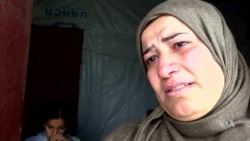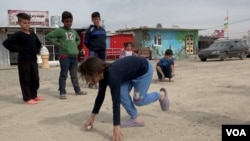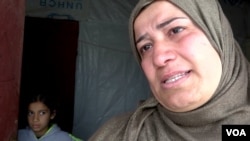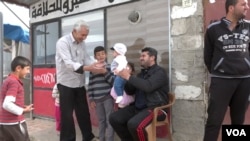The car ground its way over the gravel dirt road and turned the corner. And there, in the middle of the sprawling Domiz refugee camp, a wedding gown shop.
Long pink, white and red dresses hung in the dusty window of the one-room cement brick building topped with red corrugated tin.
There are many weddings in the camp, home to more than 40,000 Syrians who have fled the war during the past five years. Sometimes there are even mass weddings. Children and babies are everywhere.
Love, however, is not easy in Domiz.
Many families are crowded into small cement block units, or tents, and there is not much to do. The pressure of living that way year after year is taking its toll.
“These refugees have been staying in tents, and you can imagine the issues that we have, be it psychological, or even domestic violence. You have the whole family of seven people living in a small tent,” said Tanya Kareem, head of the UNHCR sub-office in Dohuk, northern Iraq.
With the war in Syria about to enter its sixth year, donor fatigue is setting in. Kareem said funding constraints are affecting what UNHCR can do for the refugees.
According to UNHCR, there are some 245,000 Syrian refugees in Iraq, most of them in Kurdistan. Khalisa Sabri Ali, a tall woman in her early 30's, has been in the Domiz camp for more than three years. Her morning was spent sitting on a wood bench, holding her younger children, watching the older ones play in the dirt roads.
In Syria, Sabri Ali said, she had a house, her husband had a job and she dreamed of her children going to college. Now, she has nothing.
She stood up, held her green and brown dress a couple of inches above the ground and bent down with a small hand shovel to scrape up a collapsing hill of gravel on the dirt road.
Done, she walked down a tiny alleyway between cement block houses, some covered in blue tarp. In the doorway of the space she shared with her five children and disabled husband, she turned and tried to smile.
In Syria, she continued, her son had been a top student. Now he was the only one working to support the family. She covered her face with her hands as tears poured. One daughter hid in her dress; another started crying.
Sabri Ali looked up.
“What was called Syria does not exist anymore. There is nothing now. It is all in ruins. I have no hope that Syria will return to normal. There is no hope, there is nothing. Forget about Syria,” said Sabri Ali.
She said going to Europe was the only hope, regardless of the risks. Thousands of refugees already have fled to Europe.
Hussain Ali’s daughter was one of them. She left in January with her husband and children. She never made it. Like hundreds of others, she drowned during the sea crossing.
Even Ali, a lanky man who runs a tiny shop in the camp with the help of a grandson, felt there was little to be gained by staying. He said business was dropping off, and it was becoming harder to get by.
“Things are getting worse here. We may have a chance at a better life in Europe, but staying here, it will be even worse,” he said.









